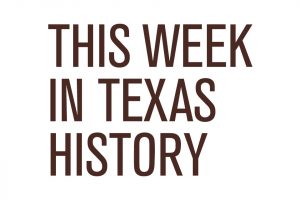By Bartee Haile
Hundreds of “Rough Riders” descended on San Antonio on May 5, 1898 itching to lend Teddy Roosevelt a hand in kicking the Spaniards out of Cuba.
In the crowded lobby of the Menger Hotel, tobacco-chewing cowboys rubbed shoulders with East Coast dandies, one and all anxious to renew acquaintances with the charismatic Roosevelt. The 39 year old assistant secretary of state had resigned to personally conduct the three-week boot camp to whip everybody into shape for the invasion of Cuba.
War with Spain had been a long time coming. As centuries go, the nineteenth was a very bad one for the declining European power. Mexico along with every other New World colony except Cuba and Puerto Rico had slipped through Madrid’s fingers. Stung by the embarrassing losses, Spain hung on for dear life to its last precious few possessions.
In Cuba regular revolts were cruelly crushed. During the 1850’s, rebel leaders appealed for U.S. aid with some even calling for wholesale annexation. American attempts to buy the island and be done with it were spurned by the short-sighted Spaniards.
Heavy casualties and brutal oppression slowed but never stopped the struggle of the Cuban people. The revolution gradually gained ground, and by 1898 the insurgents controlled the countryside and bottled up the government troops in the cities.
To protect American interests and citizens from a rash of riots, President William McKinley sent a battleship to Havana. When the Maine exploded and sank on Feb. 15, 1898 killing 260 seamen, hostilities seemed certain.
For months rival publishers William Randolph Hearst and Joseph Pulitzer had hyped the Caribbean crisis to boost circulation. The steady flow of inflammatory reports from Cuba sensationalizing Spanish crimes real and imagined had lowered traditional resistance to foreign adventures. In the emotional aftermath of the Maine disaster, America came down with a serious case of war fever.
Flimsy evidence did not deter public condemnation of Spain for the slaughter of the helpless crew. In fact, the cause of the blast that ripped apart the Maine was never definitively determined, and strong suspicions persist to the present that Cuban rebels blew up the battleship to provoke American intervention.
Congress made it official on Apr. 25, 1898. Leonard Wood, the presidential physician and Medal of Honor recipient, was put in charge of the First Cavalry Volunteers with Roosevelt second in command. Logically the legion should have been named for the head man, but from the start the horseback heroes were known as “Roosevelt’s Rough Riders.”
From the flood of 23,000 applications, a thousand were accepted. Membership in the elite group was at first restricted to residents of the four territories: Arizona, New Mexico, Oklahoma and the Indian Territory. But the ranks were soon thrown open, and 127 Texans eventually constituted the largest contingent.
Famed Texas Ranger Lee Hall offered the services of an entire detachment, but the mass enlistment was rejected. Reapplying as individuals, however, the Rangers were warmly welcomed.
On the other side of the globe, the Stars and Stripes was hoisted over the Philippines. Commodore George Dewey caught the enemy napping and scored a stunning victory against the Spanish fleet.
In the early hours of May 30, 1898, the last trainload of Rough Riders pulled out of San Antonio en route to Tampa, Florida. At every whistle-stop on the long ride through the South, the cavalrymen were cheered as celebrities.
For the first time since the Civil War, American fighting men were bound for battle against a common foe. Though far from forgotten, the deep wounds of the national nightmare were finally starting to heal.
Mobilization on such a massive scale strained the rusty U.S. military machine. Only 600 Rough Riders reached the shores of Cuba in the 16,000-man invasion, and most were forced to leave behind their mounts.
The horseless cavalry charged up Kettle Hill on July 1, 1898 and straight into the history books. Spanish resistance evaporated, and the “splendid little war” was over in a couple of weeks. Cuba and Puerto Rico were added to the Pacific trophies.
Left to languish in disease-infested Cuba, more Rough Riders succumbed to tropical sicknesses than combat wounds. Mustered out in September after 133 days of active duty, one in three had taken a bullet or fallen ill.
As for Teddy Roosevelt, his front-page exploits catapulted him into the governorship of New York. He filled in as McKinley’s second-term running mate after the death of Vice-President Garret Hobart, and a crazed assassin promoted the Rough Rider to the presidency in 1901.
Bartee welcomes your comments and questions at P.O. Box 152, Friendswood, TX 77549 or haile@pdq.net and invites you to visit his web site at barteehaile.com.






